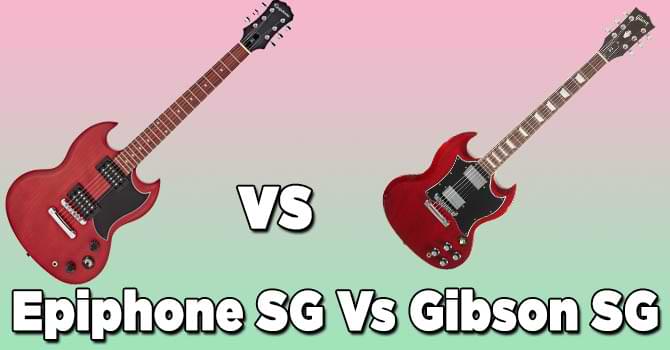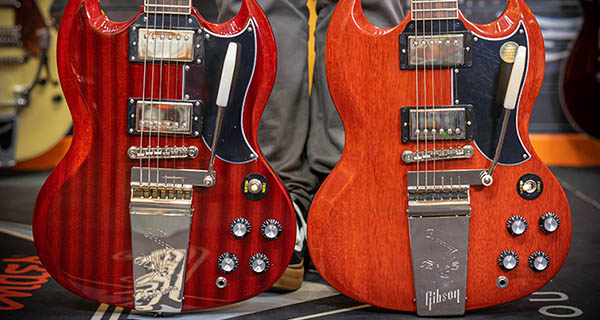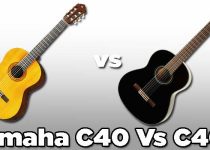Epiphone SG Vs Gibson SG [Difference & Which is better]
The Gibson SG and Epiphone SG are legendary electric guitars that have captivated musicians and enthusiasts worldwide. With iconic designs and powerful sounds, they symbolize rebellion and musical expression.
Both the Epiphone SG vs Gibson SG offer a comfortable playing experience, thanks to their similar body and neck construction. Factors such as neck profile, weight, balance, and personal preference can impact comfort.

Gibson SGs typically have slimmer neck profiles and are lighter, while Epiphone SGs may have slightly thicker necks and can be slightly heavier. In this article, we compare the quality, craftsmanship, and performance of these two remarkable instruments.
# Table of Contents =>
Comparison Table:
| Feature | Gibson SG | Epiphone SG |
| Price Range | High-end, premium pricing | More affordable, budget-friendly |
| Construction | Solid mahogany body and neck | Solid mahogany body and neck |
| Pickups | High-quality Gibson pickups | Epiphone pickups (usually equipped with Alnico magnets) |
| Hardware | High-quality hardware and components | Good-quality hardware and components |
| Finish options | Wide range of finishes available | Limited finish options |
| Craftsmanship | Superior craftsmanship and attention to detail | Good craftsmanship, but not as refined as Gibson |
| Sound | Versatile tone with rich harmonics | Solid sound, but not as nuanced as Gibson |
| Playability | Smooth and comfortable to play | Comfortable playability, but may require minor adjustments |
| Brand reputation | Iconic brand with a long history | Trusted subsidiary brand of Gibson |
Epiphone SG Overview Details:
The Epiphone SG is a legendary electric guitar known for its double-cutaway design, powerful sound, and playability. It originated in the 1960s as a lighter alternative to the Les Paul model. Epiphone began producing its own versions, offering more affordable options while maintaining the SG’s iconic features.
The guitar features a solid mahogany body, dual humbucking pickups, and reliable hardware. It has been wielded by influential artists like Angus Young and Tony Iommi. The Epiphone SG is a timeless instrument that combines history, craftsmanship, and a rock ‘n’ roll spirit.
Throughout its history, the Epiphone SG has seen various iterations and special editions. Some notable variations include the Epiphone SG Custom, which features gold hardware, block fretboard inlays, and multiple binding; the Epiphone SG Special, a more affordable version with simplified features.
The Epiphone SG has gained popularity among guitarists across different genres. Epiphone maintains high standards in construction and craftsmanship for their SG models, ensuring they offer quality instruments at accessible price points. They strive to deliver a reliable and satisfying playing experience.
Gibson SG Overview Details:
The Gibson SG originated in the 1960s as a redesign of the Les Paul model. Gibson aimed to create a lighter and more streamlined instrument, resulting in the origin of the SG (Solid Guitar). Despite the Les Paul continuing in production, the SG quickly gained popularity and evolved into its own distinctive line.
The Gibson SG has undergone various transformations and iterations. From its initial introduction to the present day, the SG has seen different models, including the Standard, Custom, Special, and Junior. These models feature a range of finishes, neck profiles, pickup configurations, and hardware options, catering to the preferences of musicians.
The Gibson SG stands out with its solid mahogany body and a sleek double-cutaway design. This is allowing easy access to the higher frets. With its rich history, striking design, and versatile sound, the SG has secured its place in the pantheon of legendary guitars. From its inception as a redesign of the Les Paul to its enduring legacy on stages worldwide, the Gibson SG continues to inspire musicians, symbolizing the enduring spirit of rock ‘n’ roll.
Main Difference Between The Epiphone SG Vs Gibson SG Iconic Guitars:
a) Sound Quality:

Both the Epiphone SG and Gibson SG deliver exceptional sound quality, but there are nuanced differences. Gibson SGs, with their superior craftsmanship and premium components, often exhibit slightly better tonal characteristics, including enhanced resonance, depth, and clarity. Epiphone SGs, while still impressive, may have a slight variance in sound due to differences in construction and materials.
b) Pickups:
Epiphone SGs typically offer excellent output and a wide range of tones for their humbucker pickups. Gibson SGs, often feature Gibson’s renowned PAF-style humbuckers, known for their exceptional clarity and warmth.
c) Body Design:

Both guitars share the iconic double-cutaway SG body shape. While the overall design is similar, Gibson SGs are typically made from premium tonewoods, which can enhance their resonance and sustain compared to the Epiphone SG’s mahogany body.
d) Neck:
Both guitars generally feature mahogany necks, providing a warm and resonant tone. Gibson SGs often have slightly more attention to detail in terms of neck shaping and finishing, offering a smoother playing experience.
e) Fretboard Material:
Epiphone SGs typically feature a rosewood fretboard, known for its smooth texture and warm tone. On the other hand, Gibson SGs often sport a higher-end fretboard material, such as ebony, which offers enhanced sustain, clarity, and a luxurious feel.
f) Scale Length:
The scale length of both the Epiphone SG and Gibson SG is 24.75 inches (628 mm), which is common in many Gibson models. This scale length contributes to a comfortable playing experience and a rich, full sound.
g) Bridge Types:

Epiphone SGs usually come with a tune-o-matic bridge and stop-bar tailpiece, while Gibson SGs often feature a more advanced and adjustable ABR-1 bridge or a Nashville Tune-o-Matic bridge. These bridge options on Gibson SGs provide enhanced intonation and string height adjustment capabilities.
h) Tuning Stability:
Both guitars can offer good tuning stability when properly set up. However, Gibson SGs, with their higher-quality hardware and meticulous craftsmanship, tend to provide slightly better tuning stability over extended playing periods.
i) Weight:
The weight of the guitar can impact comfort during long playing sessions. Gibson SGs are known for their lighter weight compared to some other electric guitars, which can reduce strain on the player’s shoulder and neck. Epiphone SGs may be slightly heavier due to differences in materials and construction, although they are still generally manageable.
j) Balance:
The balance of the guitar affects how it hangs when playing both standing up and sitting down. Gibson SGs are known for their excellent balance, which contributes to their comfortable playing experience. Epiphone SGs may have a slightly different balance due to variations in materials and components, but they still maintain a reasonable balance overall.
k) Playability:

Both guitars offer excellent playability, but Gibson SGs often receive accolades for their superior craftsmanship and attention to detail. Which it result in smoother fretwork, more comfortable neck profiles, and a more refined playing experience.
Read More: Gibson ES 330 Vs 335 [Difference & Performance]
l) Price:
Epiphone SGs are generally more affordable than their Gibson counterparts. This makes them an appealing option for budget-conscious players. They provide excellent value for the price, offering solid performance and tone at a more accessible cost. Gibson SGs, being top-tier instruments with premium craftsmanship, carry a higher price tag, reflecting their superior materials, meticulous construction, and brand prestige.
In the end, The Epiphone SG vs Gibson SG are both iconic guitars with their own distinct characteristics. The Epiphone SG provides affordability without compromising on quality, making it suitable for players on a budget. The Gibson SG represents the pinnacle of craftsmanship and is favored by professionals. Consider your budget, preferences, and playing style to determine which guitar best suits your needs.
Last Updated on August 19, 2023 by Perry Garner


